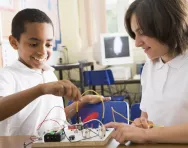Important update from TheSchoolRun
For the past 13 years, TheSchoolRun has been run by a small team of mums working from home, dedicated to providing quality educational resources to primary school parents. Unfortunately, rising supplier costs and falling revenue have made it impossible for us to continue operating, and we’ve had to make the difficult decision to close. The good news: We’ve arranged for another educational provider to take over many of our resources. These will be hosted on a new portal, where the content will be updated and expanded to support your child’s learning.
What this means for subscribers:
- Your subscription is still active, and for now, you can keep using the website as normal — just log in with your usual details to access all our articles and resources*.
- In a few months, all resources will move to the new portal. You’ll continue to have access there until your subscription ends. We’ll send you full details nearer the time.
- As a thank you for your support, we’ll also be sending you 16 primary school eBooks (worth £108.84) to download and keep.
A few changes to be aware of:
- The Learning Journey weekly email has ended, but your child’s plan will still be updated on your dashboard each Monday. Just log in to see the recommended worksheets.
- The 11+ weekly emails have now ended. We sent you all the remaining emails in the series at the end of March — please check your inbox (and spam folder) if you haven’t seen them. You can also follow the full programme here: 11+ Learning Journey.
If you have any questions, please contact us at enquiries@theschoolrun.com. Thank you for being part of our journey it’s been a privilege to support your family’s learning.
*If you need to reset your password, it will still work as usual. Please check your spam folder if the reset email doesn’t appear in your inbox.
Transition time: from primary to secondary

When children move schools from primary to secondary, it’s a time of great change and mixed feelings are natural. “I was scared that I might not make any friends and that I'd get bullied, although I was excited too because it was such a big step in my life,” explains eleven-year-old Chris.
Children worry about getting lost in the maze of corridors, about not fitting in, about their spelling, the journey – the list is endless.
How you can help your child cope
Talking through issues and concerns with your child builds their confidence and gives them support in coping with the practical and emotional worries they may be experiencing. Try asking your child these three questions to get the conversation going:
- What is the best thing about your new school?
- What will you miss most about your old school?
- What is the scariest thing about your new school?


Download Year 6 to 7 transition packs
- English & Maths transition packs
- Practise journalistic writing, figurative language, persuasive text and more
- Revise key maths methods and concepts
Many larger schools have their own websites, which can offer answers to a lot of your child’s questions. You can find out about school trips, sports fixtures, homework expectations, and the choice of clubs on offer, which can all help alleviate the uncertainty.
As moving schools can be a stressful time, don't be surprised if your child loses their temper or gets irritable more often. They may start to argue with you over trivial things like their school uniform, packed lunch or pencil case. Remember to keep your mind on the bigger picture of supporting your child through these changes and be patient with them.
Pupils with special educational needs can experience high levels of anxiety when making the transition to secondary school, but transition planning can help to ease the process. Free Moving On to Secondary School guides have been developed by the Foundation for People with Learning Disabilities, incorporating the experiences and views of Year 7 pupils, as well as parents, teachers and SENCOs.
Top tips for kids starting secondary school
- Encourage your child to be organised. Get them to pack their bag, pencil case etc the night before so they don't have to worry in the morning.
- Remind them never be afraid to ask for help, or talk to someone they trust, like you or their tutor if they’re concerned about anything.
- Suggest they make the first effort to make new friends.
- First impressions last a long time, so encourage them to make sure theirs are good ones – for organisation, presentation, and behaviour!
- Encourage them to make the most of all the new opportunities. They will have the chance to try out new clubs and activities.
- Help them to find out about the layout of the school, and learn where classrooms are (and the toilets!)
- Remind them to find out what their timetable is, what time they need to be at school, and what time they can go home.
- Make sure they know what uniform they need, and what to bring in for sport.
- Encourage them to enjoy it! Making new friends and learning new things is exciting. Remind them that everyone else is in the same boat, so they should just aim to have a good time!
Sue Atkins is a parent coach and author of Raising Happy Children for Dummies.








